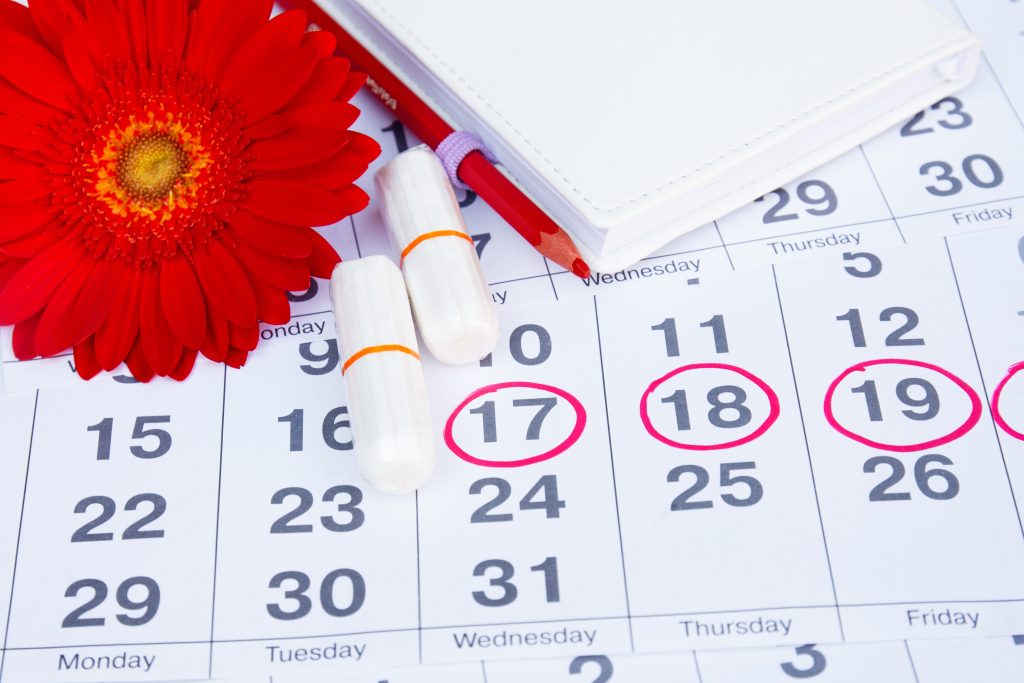I started using a period tracking app last year because I wanted to have a concise record of my cycle. When I was younger, my mom taught me to mark a “P” for the start of my cycle on the calendar, and that was how we kept track of our cycles for years. And years and years in my mom’s case.
However, that method still left a lot of unanswered questions. How long did my period last on average? What did I crave the most leading up to my cycle? Was there a pattern in my bloating or other stomach conditions throughout my cycle? These questions and more drove me to search out a good period tracking app that suited my needs.

Research: Style, Options, Purpose
You’ll probably have to check out a lot of apps before finding one that works for you. Functionality is one thing to test out, but design-wise, some period tracking apps will rule themselves out automatically. A lot of these apps are pregnancy focused, which may not be why you’re using it, and the aesthetic might put you off. Some of them also rely on stereotypical ideas of femininity with lots of pink and flowers and cutesy emojis. Again, this might not appeal to you.
Give yourself time to find the app that looks and works best for you.
See Also: What You Need to Know for Mental Health Awareness Month
Functionality: Features Galore but Still Not Enough
I ended up using Clue. Clue has a lot of features I like such as the ability to track flow volume, cravings, and acne. There are numerous categories and tags, like one for your hair so you can tracking how oily it is on any given day. You can also track what sort of exercising you’re doing with four options (running, yoga, biking, or swimming). These weren’t things I had considered tracking before, but the prospect of being able to excited me.
But in reality, I don’t really use those features all that much. Tracking those minute details like my hair quality ended up feeling too overwhelming. On the flip side, with all the tags and categories, I found they don’t really fit my needs. “Running, yoga, biking, and swimming” are all great, but what about if I attend a kickboxing class or take a nice long walk? The tags don’t really serve my needs, and there are no options to change them, either.
See Also: Why We Should All Be Talking About Endometriosis
I was interested in seeing if spikes in my anxiety are linked to my cycle. However, there’s no anxiety tag. The pain interface also doesn’t have some of the pain tags I need like back pain, so while there are all these options, there still are not the options I need to make it super useful.
Clue tries to offset this phenomena by having a section where you can put your own tags in. However, all the Clue-generated tags have cute images on them, and the user-generated tags are just grey blocks. This discrepancy between the two tags is minor, but it enforces dominant ideas about menstruation, what symptoms are common, and if you don’t fit within these constraints, then companies don’t make products for you.
See Also: The New App Cover Prevents Harrasment and Saves the Dating Game

Data and Privacy Concerns
Over the years, information on companies collecting our personal information and selling it to other companies has come to light. This has led to an increase in data protection laws, but unfortunately, there are no federal regulations for health apps in the US. Health apps are free to sell your confidential information to any number of big-name (Facebook, Google) or smaller-name partners.
Hopefully, apps are only collecting info to track user feedback and make upgrades to their apps to improve functionality. But, app companies are also free to do malicious things with your info such as selling it to marketing companies so they can tailor ads to you. Pregnancy has become very heavily monetized and commercialized. Ads marketed towards prospective moms coming out of period tracking apps have been well-documented.
See Also: Home Remedies for Menstrual Cramps
Be sure to look through the privacy policies of any app you try. Some of these apps have more reader-friendly policies than others. It might be more appealing to use apps developed outside of the US and in the EU, since there are firmer regulations in the European Union about what kind of information companies can share. Clue is developed by BioWink, a German company, and that’s partially why Clue has an easier privacy policy to read than some others, and even provides users the ability to delete their data.
That’s not to say all US-based apps are profiting off your information. US-based apps like Flo are taking steps to better protect your information. As long as you do your research, you’ll be able to make an informed decision about what you’re comfortable with.
See Also: How to Deal with Aunt Flo During the Summertime
Easily Accessible Information When I Need It
One of the perks about using a period tracking app means I have the information wherever I go. I can’t count the number of times I’ve been at the doctor and had them turn to me and ask, “When was your last period?”
“Uh…” I’d reply, frantically wracking my brain to visualize the red mark on the calendar hanging in my room.
Now, I can whip out my phone and answer with confidence.
I can also mark symptoms down at any part of the day. Sitting at my desk after lunch when my stomach tightens and bloats? Instead of telling myself I’ll write it at home later, I don’t have to risk forgetting anymore. I pull out my phone and swipe through to add it.
Period tracking apps are a convenient way to keep track of information. These apps are marketed as easy ways to help prevent pregnancy, help you conceive, and study menstrual related health problems. However, these apps are notorious for being unable to predict irregular cycles. The algorithms also rely on user-provided information, so if you’re not updating frequently or accurately, the results and predictions the app generates may not be useful.


